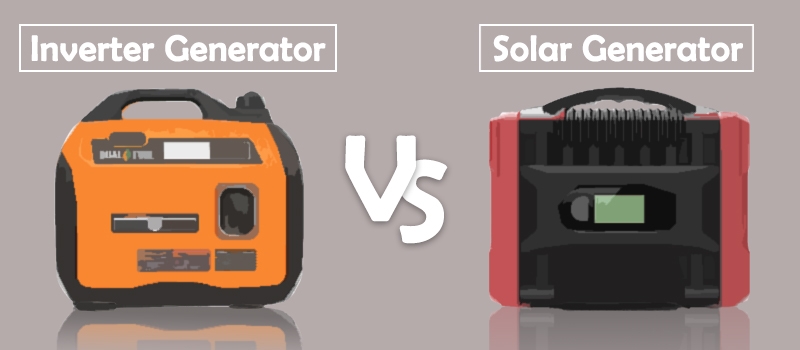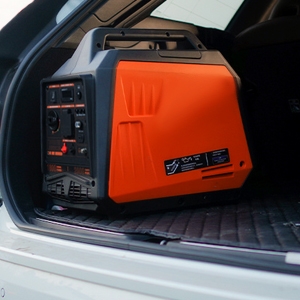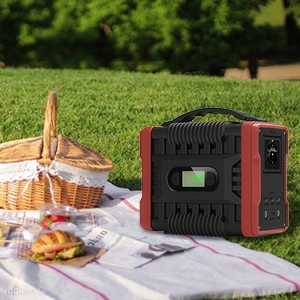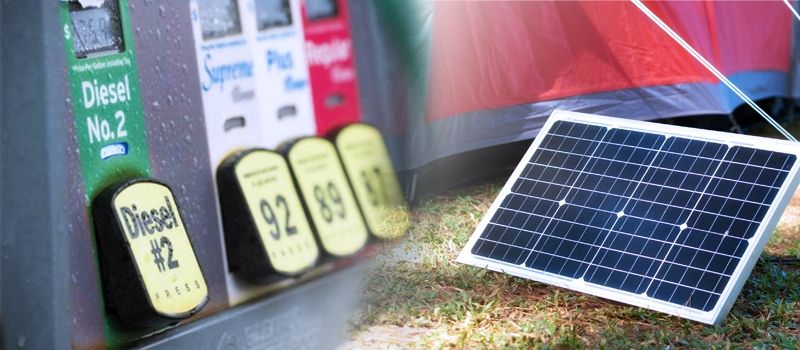As global energy demand continues to grow and environmental awareness increases, it is becoming increasingly important to find alternatives to traditional energy sources for power generation. Inverter generators and solar generators are two power generation devices that have attracted a lot of attention, each utilizing different energy sources and principles to generate electricity. In this blog, we will explore the differences between these two types of generators in detail, including information on how they work, where they are used, their pros and cons, and more.

Inverter Generator
An inverter generator is a type of power generation equipment capable of generating variable-frequency alternating current (AC). It usually consists of a prime mover, generator itself, inverter, control system, output device, cooling system and other parts.
The prime mover can be an internal combustion engine, a steam turbine, a wind turbine, or the like, and is responsible for converting mechanical energy into electrical energy. The generator is usually an alternator that converts the rotation of the prime mover into alternating current. The inverter is the core component of an inverter generator, which regulates the output voltage and frequency to meet the demands of different loads and power grids.

The main advantages of inverter generators are as follows:
- Flexibility: inverter generators can adjust the output voltage and frequency according to the load demand, adapting to different power equipment.
- High efficiency: through inverter technology, the generator can run in the best working condition, improve power generation efficiency and reduce energy consumption.
- Good starting performance: Inverter generators can provide low voltage and high current starting, which is favorable for the starting of electric motors and other equipment.
However, inverter generators also have some disadvantages:
- High maintenance costs: As inverter generators require more delicate control circuits and electronic components, they often need to be coupled with more complex maintenance and testing procedures to ensure stable operation, which also puts a higher demand on maintenance costs.
- Certain impact on environment: Some prime movers (e.g. internal combustion engines) produce noise and exhaust gases during operation, which have a certain impact on the environment.
Solar Generator
A solar power generator is a part of a photovoltaic power system, which is a power generation device that utilizes sunlight to generate electricity from solar panels. The solar power generator is to be used in conjunction with the photovoltaic module, inverter, energy storage device, solar charge controller and so on.
The solar panel is the core part of the PV system and is responsible for converting sunlight into electricity. The inverter converts DC power into AC power for daily use. Energy storage devices such as batteries are used to store electricity, and solar charge controllers are responsible for monitoring battery status to prevent overcharging and over-discharging.
The main advantages of solar generators are listed below:

- Environmentally friendly: Solar energy is a kind of renewable energy, solar generator does not produce noise and exhaust gas in the process of power generation, no pollution to the environment.
- Energy saving: solar generators can reduce the consumption of fossil energy, which helps to reduce greenhouse gas emissions and mitigate global warming.
- Economical: With the development of photovoltaic technology, the cost of solar power generation equipment is gradually reduced. It has a higher long-term operating income because sunlight is free.
Yet, there are some disadvantages of solar power generators:
- Affected by weather: The output power of solar generators is greatly affected by weather conditions, and the efficiency of power generation decreases during cloudy and rainy weather. In areas with low sunshine, solar generators do not generate electricity well.
- Takes up more space: Due to the need to lay solar panels, solar generators require a larger installation area and are not suitable for places with limited space. Inverter generators, on the other hand, can be used continuously by simply injecting fuel.
How to Choose
There are several factors to consider when choosing between an inverter generator and a solar generator. Here are some key points to help you make your choice:
Applicable area
If you are in a sunny area, a solar generator may be a more sustainable option.
Inverter generators are weatherproof and suitable for all geographic locations, especially in areas with variable weather or low sunlight.
Installation space
Solar generators may require a large installation space, especially if a large amount of power is needed. However, you can build a solar energy green building to experience the joys of off-grid living.
Inverter generators can be sized as needed and are often more compact than solar systems, making them easy to place in the trunk of your car when you're out and about.
Environmental impact
Solar generators are a clean, renewable source of energy with a low environmental impact. Not only that, but the use of solar energy is free of charge, with low long-term operating costs.
The environmental impact of variable frequency generators depends on the type of prime mover. Primary motors that use fossil fuels produce greenhouse gases and pollutants.

If it is desired to combine solar power with inverter generators, a hybrid power generation system can be designed in which the solar panels and the inverter generators operate independently of each other and their output power is converted and integrated into the same grid through inverters. Such a system can prioritize the use of solar power generation when there is sufficient solar energy and supplement it with inverter generators when there is insufficient solar energy, resulting in a more reliable and efficient energy supply.
In conclusion, inverter generators and solar generators have their own advantages and shortcomings, and in practical applications, we can choose the appropriate power generation equipment according to the actual needs and conditions. You can visit powerhome.com to purchase a high quality inverter generator or solar generator. With the progress of science and technology, I believe that the future of these two kinds of power generation equipment will continue to improve, to provide mankind with more efficient and cleaner electricity.
(1).png)
(1).png)